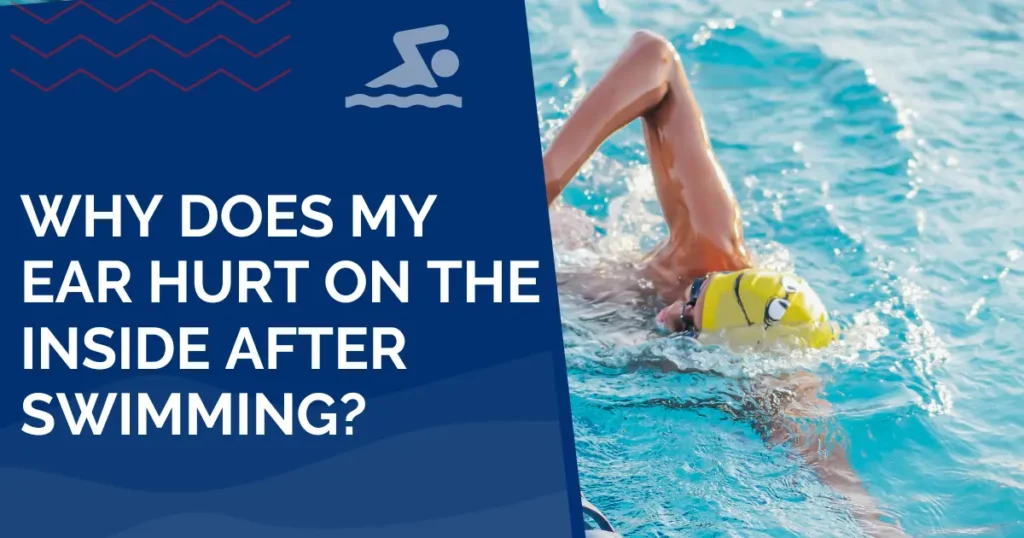Swimming is a great way to relax, but it can sometimes leave you with unexpected discomfort. If you’ve ever asked yourself, why does my ear hurt on the inside after swimming?you’re not alone. Many people experience ear pain after a dip in the pool or ocean. But why does this happen? In this article, we’ll explore the common reasons behind ear pain after swimming, what causes it, and how you can prevent and treat this issue. Whether you’re a frequent swimmer or just enjoy the occasional swim, knowing why this happens can help you avoid discomfort in the future.
Causes of Ear Pain After Swimming
There are several reasons you might feel pain in your ear after swimming. The most common cause is swimmer’s ear, an infection of the outer ear canal that occurs when water remains trapped inside the ear. But that’s not the only potential culprit. Here are some reasons you may experience this kind of ear pain:
1. Swimmer’s Ear
Swimmer’s ear, or otitis externa, happens when water gets trapped in the ear canal, creating a moist environment where bacteria or fungi can grow. This infection can cause itching, pain, and even swelling inside the ear. Symptoms may worsen if untreated, leading to more severe discomfort.
2. Ear Barotrauma
When you dive underwater or swim at certain depths, the pressure around you increases. This can cause ear barotrauma, where the pressure in your ear differs from the water pressure outside, resulting in pain. It’s similar to the feeling some people get when flying.
3. Water Trapped in the Ear Canal
Sometimes, pain can occur simply because water is stuck in your ear. This trapped water can create pressure and make the ear canal feel full. Although this condition may not cause infection immediately, it can be uncomfortable and lead to swimmer’s ear if left untreated.
4. Preexisting Ear Conditions
If you have underlying ear issues, such as earwax buildup or chronic ear infections, you may be more prone to experiencing ear pain after swimming. Earwax, for instance, can trap water and block your ear canal, resulting in discomfort and infection.
How to Prevent Ear Pain from Swimming
Preventing ear pain is easier than dealing with it after it happens. If you often ask yourself, why does my ear hurt on the inside after swimming?, it’s worth trying out these simple prevention tips:
1. Use Earplugs
Wearing waterproof earplugs specifically designed for swimmers can help prevent water from entering your ear canals.
2. Dry Your Ears Properly
After swimming, tilt your head to each side to let any trapped water drain from your ears. You can also use a soft towel or a hair dryer on a low setting to gently dry your ears.
3. Avoid Swimming in Dirty Water
Swimming in water that is not clean, like lakes or rivers, can increase the risk of infections. If you must swim in these environments, take extra care to dry your ears afterward.
4. Use Alcohol-Based Ear Drops
Using over-the-counter ear drops containing alcohol can help evaporate any remaining water in your ear after swimming.
Treatment Options for Ear Pain
If you already have ear pain after swimming, there are several ways you can treat it. The treatment options will vary depending on the root cause of the pain.
1. Over-the-Counter Pain Relievers
Medications like ibuprofen or acetaminophen can help reduce pain and inflammation caused by ear infections or pressure changes.
2. Prescription Ear Drops
If you suspect an infection like swimmer’s ear, consult a doctor. They may prescribe medicated ear drops that contain antibiotics or antifungal agents to clear up the infection.
3. Home Remedies
For minor cases of ear pain, simple home remedies like applying warm compresses to the outside of the ear or using a mixture of equal parts vinegar and rubbing alcohol as ear drops may help alleviate discomfort.
When to See a Doctor
If your ear pain persists for more than a few days, or if you experience additional symptoms like hearing loss, fever, or severe swelling, it’s important to see a healthcare provider. Ignoring these symptoms could lead to more serious complications.
Experiencing ear pain after swimming can be frustrating, but it’s usually preventable and treatable. Whether it’s due to trapped water, swimmer’s ear, or pressure changes, knowing why this happens is the first step toward managing the problem. By taking precautions and acting quickly when pain occurs, you can continue enjoying your time in the water without discomfort.
If ear pain after swimming is a recurring issue, consider consulting an ear specialist to get professional advice tailored to your situation.



